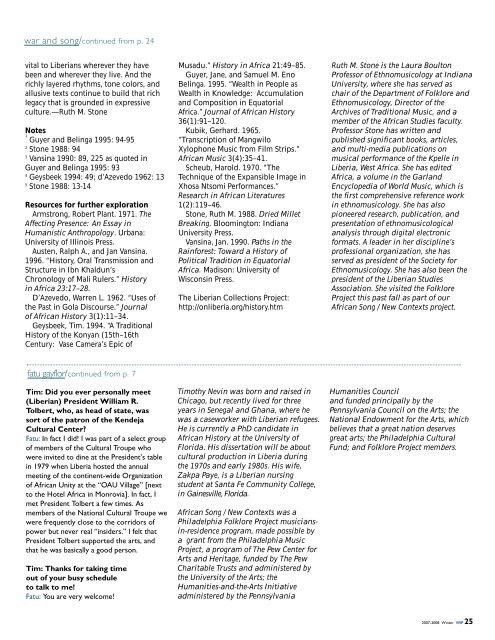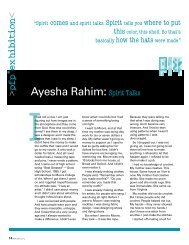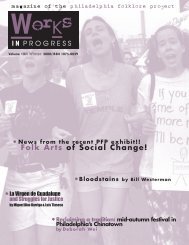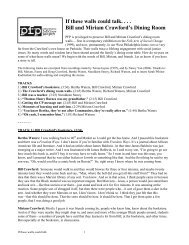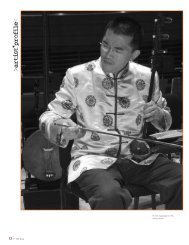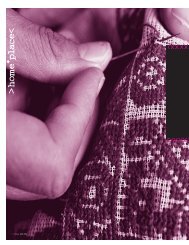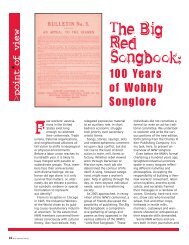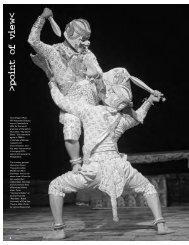African song / Fatu Gayflor ⢠War and wealth - Philadelphia Folklore ...
African song / Fatu Gayflor ⢠War and wealth - Philadelphia Folklore ...
African song / Fatu Gayflor ⢠War and wealth - Philadelphia Folklore ...
Create successful ePaper yourself
Turn your PDF publications into a flip-book with our unique Google optimized e-Paper software.
war <strong>and</strong> <strong>song</strong>/continued from p. 24<br />
vital to Liberians wherever they have<br />
been <strong>and</strong> wherever they live. And the<br />
richly layered rhythms, tone colors, <strong>and</strong><br />
allusive texts continue to build that rich<br />
legacy that is grounded in expressive<br />
culture.—Ruth M. Stone<br />
Notes<br />
1<br />
Guyer <strong>and</strong> Belinga 1995: 94-95<br />
2<br />
Stone 1988: 94<br />
3<br />
Vansina 1990: 89, 225 as quoted in<br />
Guyer <strong>and</strong> Belinga 1995: 93<br />
4<br />
Geysbeek 1994: 49; d’Azevedo 1962: 13<br />
5<br />
Stone 1988: 13-14<br />
Resources for further exploration<br />
Armstrong, Robert Plant. 1971. The<br />
Affecting Presence: An Essay in<br />
Humanistic Anthropology. Urbana:<br />
University of Illinois Press.<br />
Austen, Ralph A., <strong>and</strong> Jan Vansina.<br />
1996. “History, Oral Transmission <strong>and</strong><br />
Structure in Ibn Khaldun’s<br />
Chronology of Mali Rulers.” History<br />
in Africa 23:17–28.<br />
D’Azevedo, <strong>War</strong>ren L. 1962. “Uses of<br />
the Past in Gola Discourse.” Journal<br />
of <strong>African</strong> History 3(1):11–34.<br />
Geysbeek, Tim. 1994. “A Traditional<br />
History of the Konyan (15th–16th<br />
Century: Vase Camera’s Epic of<br />
Musadu.” History in Africa 21:49–85.<br />
Guyer, Jane, <strong>and</strong> Samuel M. Eno<br />
Belinga. 1995. “Wealth in People as<br />
Wealth in Knowledge: Accumulation<br />
<strong>and</strong> Composition in Equatorial<br />
Africa.” Journal of <strong>African</strong> History<br />
36(1):91–120.<br />
Kubik, Gerhard. 1965.<br />
“Transcription of Mangwilo<br />
Xylophone Music from Film Strips.”<br />
<strong>African</strong> Music 3(4):35–41.<br />
Scheub, Harold. 1970. “The<br />
Technique of the Expansible Image in<br />
Xhosa Ntsomi Performances.”<br />
Research in <strong>African</strong> Literatures<br />
1(2):119–46.<br />
Stone, Ruth M. 1988. Dried Millet<br />
Breaking. Bloomington: Indiana<br />
University Press.<br />
Vansina, Jan. 1990. Paths in the<br />
Rainforest: Toward a History of<br />
Political Tradition in Equatorial<br />
Africa. Madison: University of<br />
Wisconsin Press.<br />
The Liberian Collections Project:<br />
http://onliberia.org/history.htm<br />
Ruth M. Stone is the Laura Boulton<br />
Professor of Ethnomusicology at Indiana<br />
University, where she has served as<br />
chair of the Department of <strong>Folklore</strong> <strong>and</strong><br />
Ethnomusicology, Director of the<br />
Archives of Traditional Music, <strong>and</strong> a<br />
member of the <strong>African</strong> Studies faculty.<br />
Professor Stone has written <strong>and</strong><br />
published significant books, articles,<br />
<strong>and</strong> multi-media publications on<br />
musical performance of the Kpelle in<br />
Liberia, West Africa. She has edited<br />
Africa, a volume in the Garl<strong>and</strong><br />
Encyclopedia of World Music, which is<br />
the first comprehensive reference work<br />
in ethnomusicology. She has also<br />
pioneered research, publication, <strong>and</strong><br />
presentation of ethnomusicological<br />
analysis through digital electronic<br />
formats. A leader in her discipline’s<br />
professional organization, she has<br />
served as president of the Society for<br />
Ethnomusicology. She has also been the<br />
president of the Liberian Studies<br />
Association. She visited the <strong>Folklore</strong><br />
Project this past fall as part of our<br />
<strong>African</strong> Song / New Contexts project.<br />
fatu gayflor/continued from p. 7<br />
Tim: Did you ever personally meet<br />
(Liberian) President William R.<br />
Tolbert, who, as head of state, was<br />
sort of the patron of the Kendeja<br />
Cultural Center?<br />
<strong>Fatu</strong>: In fact I did! I was part of a select group<br />
of members of the Cultural Troupe who<br />
were invited to dine at the President’s table<br />
in 1979 when Liberia hosted the annual<br />
meeting of the continent-wide Organization<br />
of <strong>African</strong> Unity at the “OAU Village” [next<br />
to the Hotel Africa in Monrovia]. In fact, I<br />
met President Tolbert a few times. As<br />
members of the National Cultural Troupe we<br />
were frequently close to the corridors of<br />
power but never real “insiders.” I felt that<br />
President Tolbert supported the arts, <strong>and</strong><br />
that he was basically a good person.<br />
Tim: Thanks for taking time<br />
out of your busy schedule<br />
to talk to me!<br />
<strong>Fatu</strong>: You are very welcome!<br />
Timothy Nevin was born <strong>and</strong> raised in<br />
Chicago, but recently lived for three<br />
years in Senegal <strong>and</strong> Ghana, where he<br />
was a caseworker with Liberian refugees.<br />
He is currently a PhD c<strong>and</strong>idate in<br />
<strong>African</strong> History at the University of<br />
Florida. His dissertation will be about<br />
cultural production in Liberia during<br />
the 1970s <strong>and</strong> early 1980s. His wife,<br />
Zakpa Paye, is a Liberian nursing<br />
student at Santa Fe Community College,<br />
in Gainesville, Florida.<br />
<strong>African</strong> Song / New Contexts was a<br />
<strong>Philadelphia</strong> <strong>Folklore</strong> Project musiciansin-residence<br />
program, made possible by<br />
a grant from the <strong>Philadelphia</strong> Music<br />
Project, a program of The Pew Center for<br />
Arts <strong>and</strong> Heritage, funded by The Pew<br />
Charitable Trusts <strong>and</strong> administered by<br />
the University of the Arts; the<br />
Humanities-<strong>and</strong>-the-Arts Initiative<br />
administered by the Pennsylvania<br />
Humanities Council<br />
<strong>and</strong> funded principally by the<br />
Pennsylvania Council on the Arts; the<br />
National Endowment for the Arts, which<br />
believes that a great nation deserves<br />
great arts; the <strong>Philadelphia</strong> Cultural<br />
Fund; <strong>and</strong> <strong>Folklore</strong> Project members.<br />
2007-2008 Winter WIP 25


